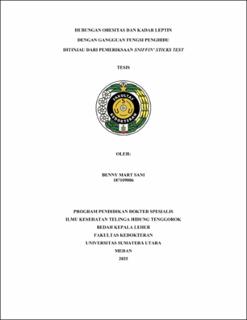| dc.description.abstract | Introduction:
Obesity is a global health problem that increases the risk of metabolic diseases, including diabetes mellitus and cardiovascular disorders. In addition, obesity is associated with impaired olfactory function, which affects eating patterns and appetite regulation. Leptin, a hormone that plays a role in metabolism, is thought to contribute to olfactory disorders. This study aims to analyze the relationship between obesity, leptin levels, and impaired olfactory function.
Materials and Methods:
This study is an analytical observational study with a cross-sectional design, conducted at the THTBKL Polyclinic of H. Adam Malik General Hospital, Medan. The sample consisted of 37 obese individuals and 37 non-obese individuals, selected using a purposive sampling method. Examination included measurement of BMI, leptin levels, and olfactory function using the Sniffin' Sticks Test. Data analysis was performed using bivariate tests and multivariate linear regression.
Results:
The majority of obese subjects were female (61.5%, p = 0.036). Median leptin levels in the obese group were higher (26.6 ng/mL, p < 0.001). Olfactory disturbances were more common in obese individuals (67.6%, p < 0.001). Subjects with hyposmia had higher leptin levels (median 38.5 ng/mL, p < 0.001). Multivariate analysis showed that obesity and leptin levels significantly influenced olfactory disturbances (p < 0.001).
Conclusion:
Obesity has a significant association with olfactory dysfunction, with higher leptin levels playing a role in the mechanism of the disorder. Further studies are needed to understand the underlying neurophysiological mechanisms.
Keywords: Obesity, leptin, olfactory function, hyposmia, metabolic disorders | en_US |


